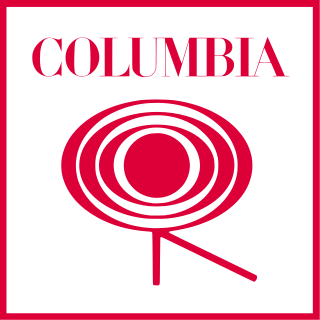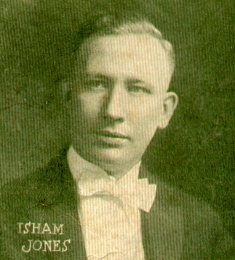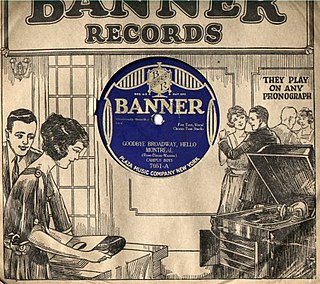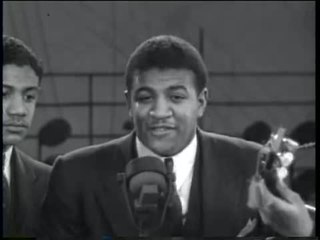
Decca Records is a British record label established in 1929 by Edward Lewis. Its U.S. label was established in late 1934 by Lewis, along with American Decca's first president Jack Kapp and later American Decca president Milton Rackmil. In 1937, anticipating Nazi aggression leading to World War II, Lewis sold American Decca and the link between the UK and U.S. Decca labels was broken for several decades. The British label was renowned for its development of recording methods, while the American company developed the concept of cast albums in the musical genre. Both wings are now part of the Universal Music Group, which is co-owned by Vivendi, a media conglomerate headquartered in Paris, and Tencent, a Chinese tech company. The US Decca label was the foundation company that evolved into UMG.

Columbia Records is an American record label owned by Sony Music Entertainment, a subsidiary of Sony Corporation of America, the North American division of Japanese conglomerate Sony. It was founded on January 15, 1889, evolving from the American Graphophone Company, the successor to the Volta Graphophone Company. Columbia is the oldest surviving brand name in the recorded sound business, and the second major company to produce records. From 1961 to 1990, Columbia recordings were released outside North America under the name CBS Records to avoid confusion with EMI's Columbia Graphophone Company. Columbia is one of Sony Music's four flagship record labels, alongside former longtime rival RCA Records, as well as Arista Records and Epic Records.

James Fletcher Hamilton Henderson was an American pianist, bandleader, arranger and composer, important in the development of big band jazz and swing music. He was one of the most prolific black musical arrangers and, along with Duke Ellington, is considered one of the most influential arrangers and bandleaders in jazz history. Henderson's influence was vast. He helped bridge the gap between the Dixieland and the swing eras. He was often known as "Smack" Henderson.

The Victor Talking Machine Company was an American record company and phonograph manufacturer headquartered in Camden, New Jersey.

Brunswick Records is an American record label founded in 1916.
Gennett was an American record company and label in Richmond, Indiana, United States, which flourished in the 1920s. Gennett produced some of the earliest recordings of Louis Armstrong, King Oliver, Bix Beiderbecke, and Hoagy Carmichael. Its roster also included Jelly Roll Morton, Blind Lemon Jefferson, Charley Patton, and Gene Autry.

Paramount Records was an American record label known for its recordings of jazz and blues in the 1920s and early 1930s, including such artists as Ma Rainey and Blind Lemon Jefferson.

Isham Edgar Jones was an American bandleader, saxophonist, bassist and songwriter.

Banner Records was an American record company and label in the 1920s and 1930s. It was created primarily for the S.S. Kresge Company, though it was employed as a budget label in other discount stores.

Puritan Records was an American record label which lasted from 1917 to 1929. For most of its existence Puritan was a product of the Wisconsin Chair Company, which also marketed Paramount Records, but as a label, Puritan briefly predates Paramount and began with United Phonographs Corporation.

Supertone Records was an American record label in the 1920s. Supertone Records were marketed by Sears, Roebuck & Co. in 1924 and again in 1929–1931.

The Winner Records was a United Kingdom-based record label from 1912 onwards. Its records were manufactured by the Edison Bell Record Works, London. This company, founded by James Hough, had originated in the early 1890s as an importer of Edison and Columbia cylinder phonographs; from 1898 Hough had also made cylinder records, initially using a separate company, Edisonia. When Edison set up his own European operation in 1904, the import franchise was withdrawn, but the name Edison Bell remained in use. From 1909 the official name of Edison-Bell was J. E. Hough Ltd.

American Record Corporation (ARC), also referred to as American Record Company, American Recording Corporation, or ARC Records, was an American record company.

Vitaphone was a sound film system used for feature films and nearly 1,000 short subjects made by Warner Bros. and its sister studio First National from 1926 to 1931. Vitaphone was the last major analog sound-on-disc system and the only one which was widely used and commercially successful. The soundtrack was not printed on the film itself, but issued separately on phonograph records. The discs, recorded at 33 1⁄3 rpm and typically 16 inches (41 cm) in diameter, would be played on a turntable physically coupled to the projector motor while the film was being projected. It had a frequency response of 4300 Hz. Many early talkies, such as The Jazz Singer (1927), used the Vitaphone system. The name "Vitaphone" derived from the Latin and Greek words, respectively, for "living" and "sound".

"Dinah" is a popular song published in 1925 and introduced by Ethel Waters at the Plantation Club on Broadway. It was integrated into the show Kid Boots. The music was written by Harry Akst and the lyrics by Sam M. Lewis and Joe Young. Hit versions in 1926 were by Ethel Waters, The Revelers, Cliff Edwards, and Fletcher Henderson.
This is the discography of Duke Ellington. Most of these recordings are listed by the year they were recorded rather than year released. Reissues are listed for most of the recordings released before the 1950s, as the original 78s are rare. The US chart listing information should be considered tentative because sources like the Joel Whitburn's Pop Memories does not take the cheaper dime-store records into account. During this period, records sold by song title, not by artist, although there are exceptions.

Lady Day: The Complete Billie Holiday on Columbia 1933–1944 is a box set 10-disc compilation of the complete known studio master recordings, plus alternate takes, of Billie Holiday during the time period indicated, released in 2001 on Columbia/Legacy, CXK 85470. Designed like an album of 78s, the medium in which these recordings initially appeared, the 10.5" × 12" box includes 230 tracks, a 116-page booklet with extensive photos, a song list, discography, essays by Michael Brooks, Gary Giddins, and Farah Jasmine Griffin, and an insert of appreciations for Holiday from a diversity of figures including Tony Bennett, Elvis Costello, Marianne Faithfull, B.B. King, Abbey Lincoln, Jill Scott, and Lucinda Williams. At the 44th Grammy Awards on February 27, 2002, the box set won the Grammy Award for Best Historical Album of the previous year.

Crown Records was a record company and dime-store label that existed from 1930 to 1933 in New York City. Its catalogue included music by Eubie Blake and Fletcher Henderson. Known as the label offering "Two Hits for Two Bits" proudly printed on their sleeves, Crown's discs sold for 25 cents.
This is a list of Bing Crosby songs he recorded twice or more during his career, excluding all of the 1954 re-recordings for Bing: A Musical Autobiography.
Edison Bell was an English company that was the first distributor and an early manufacturer of gramophones and gramophone records. The company survived through several incarnations, becoming a top producer of budget records in England through the early 1930s until, after it was absorbed by Decca in 1932, production of various Edison Bell labels ceased.
















